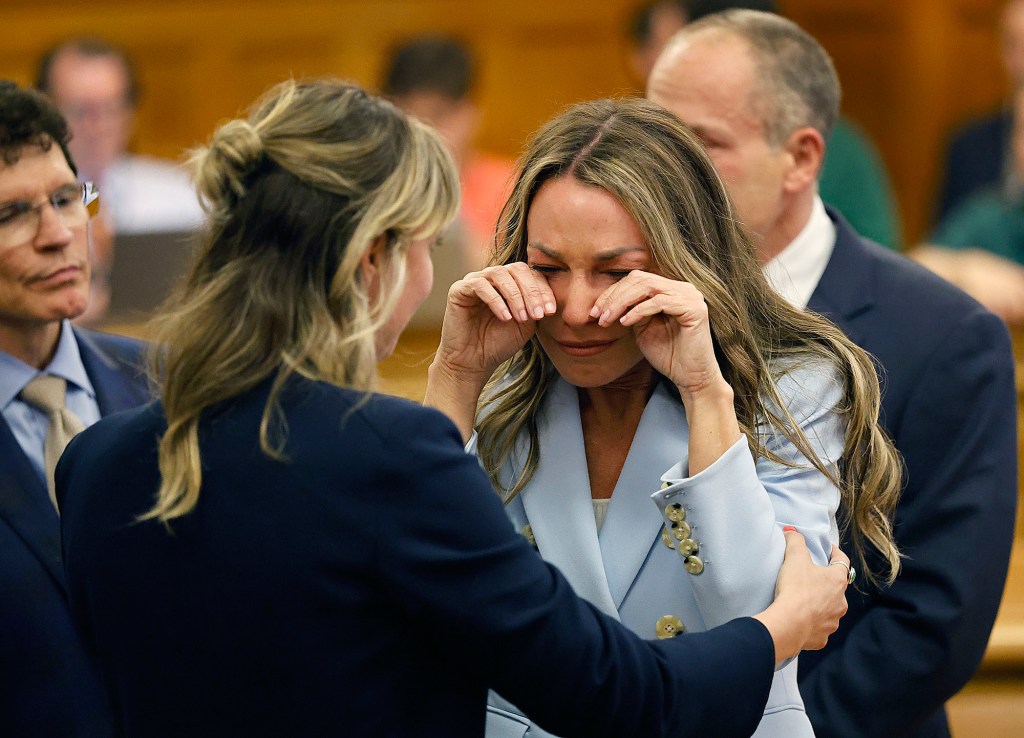Karen Read wept and the crowd outside burst into cheers after a jury cleared the 45-year-old of every count against her except for one — drunken driving — in a grueling retrial for the death of her Boston police boyfriend.
The verdict, delivered after over 20 hours of deliberations on Wednesday, was anticipated ever since jurors hinted at it with two notes earlier in the day.
Read, of Mansfield, had faced up to life in prison if convicted of second-degree murder, the top-level offense charged against her. She was also charged with manslaughter while operating a motor vehicle under the influence of liquor and leaving the scene of an accident resulting in death.
Paul O’Keefe, victim John O’Keefe’s younger brother, held his head in his hands when jurors stated their second “Not guilty” verdict to manslaughter, looked up again at the mention of guilt to a lesser offense, but looked down and gave a slow shake when he heard it was the lightest charge.
The O’Keefe family then filed out silently after the last verdict was read.
Outside the courthouse, Read, flanked by her lawyers, said, “No one has fought harder for justice for John O’Keefe than I have.”
Her father, Bill Read, said he felt relief and “tremendous thanks” to God when the verdict was read.
“We need to get our life back together, and we will,” he said.
The verdict and sentencing
The foreman of the jury, which sat through 31 days of testimony spanning more than seven weeks, answered the questions of court Clerk James McDermott in even tones as he announced the panel’s decisions. One female member of the jury showed some emotion when cheers erupted outside. All 12 deliberating jurors confirmed their verdicts and the six alternate jurors stood nearby.
A list of the jurors has been impounded by the court. Judge Beverly J. Cannone wrote that “the safety of jurors is crucial” and cited concerns from at least one juror at last year’s trial. The impoundment lasts for at least 10 days.
Two notes the jury sent foreshadowed their decision by addressing the idea of “lesser included” offenses, which could only be found under the manslaughter charge. The least of those options was operating under the influence of liquor, or OUI — the jury’s ultimate choice
Following Wednesday’s verdict, prosecutor Hank Brennan recommended Read be required to complete the state’s 24(d) program, which includes outpatient treatment, loss of license and probation. He recommended a probation sentence of one year.
“So the standard everybody else gets on a first-time OUI?” Cannone asked, to which Brennan said, “Certainly.”
Defense attorney David Yannetti seemed fine with that:
“We ask that she be treated no differently, no better than anyone,” he said.
“So I’m happy to do it,” Cannone cut in.
Retired state Superior Court Judge Jack Lu, who called the jury result “a stunning win for the defense,” said that OUI rarely results in jail time for first-time offenders.
Wednesday’s events took a dramatic turn about an hour after lunch break when Cannone summoned the parties to the court and said the jurors announced they had a verdict — and then changed their minds moments later. Only about 20 minutes later, Cannone announced the jury had reached its verdict.
The case
Brennan, a defense attorney hired as special prosecutor to take over from last year’s prosecutor Adam Lally, said the case was a “simple” one: Read killed O’Keefe in a final act of jealousy in a bad relationship.
“She got drunk, she hit him, she left him to die. It’s that simple,” he said.
In contrast, defense attorney Alan Jackson said all the evidence points to one conclusion: “There was no collision.”
He pointed toward a lack of common vehicle strike injuries to O’Keefe’s body, like bruising or broken bones in the extremities, as well as a “corrupt” police investigation that failed to conduct an adequate investigation. He also hammered the State Police investigators and the overall sloppy work by law enforcement.
“Reasonable doubt abounds,” Jackson said in his closing argument Friday.
The defense’s strategy this time around was more focused, according to observer William Kickham, another Boston defense attorney.
In the first trial, the defense leaned more into their theory that someone else had killed O’Keefe, a strategy Kickham said “was a calculated but risky gamble, since its only responsibility was to prove reasonable doubt that Ms. Read was the guilty party.
“On retrial, it was much wiser and clearly more effective strategy to argue the kinetics and physics involved in the case,” he continued. “If there was no collision, then the jury clearly couldn’t convict on murder or manslaughter.”
Howie Carr: Karen Read case a jihad against justice!
 Karen Read supporters cheer as the verdicts are read. (Stuart Cahill/Boston Herald)
Karen Read supporters cheer as the verdicts are read. (Stuart Cahill/Boston Herald)
 Karen Read shouts over the cheers from supporters outside the Dedham courthouse after being set free by a jury. (Stuart Cahill/Boston Herald)
Karen Read shouts over the cheers from supporters outside the Dedham courthouse after being set free by a jury. (Stuart Cahill/Boston Herald)
 Karen Read and Alan Jackson greet her supporters. (Stuart Cahill/Boston Herald)
Karen Read and Alan Jackson greet her supporters. (Stuart Cahill/Boston Herald)
Originally Published: June 18, 2025 at 3:06 PM EDT
